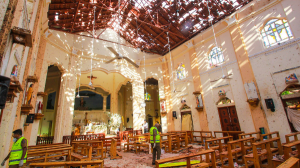Although the Islamic terrorist bombings that rocked Sri Lanka on Easter Sunday – killing more than 250 people, most in churches – have shocked many, spectacular terrorist attacks on Easter are far more common than supposed.
Jihadi logic is simple: not only do attacks on Christians during their greatest holidays make a symbolic point; but because churches are often packed then – especially Easter, or Resurrection Sunday – they also potentially offer the greatest harvest in casualties.
Therefore, on April 9, 2017 – Palm Sunday, which starts the holy week of Easter – two Christian churches in Egypt were bombed during mass; at least 50 worshippers were murdered and 130 wounded (graphic images/video of aftermath here). Two days later, another terror attack, targeting a Coptic Christian monastery, was thwarted. On April 12, 2015, Easter Sunday, two explosions targeting two separate churches also took place in Egypt. Although no casualties were reported, large numbers could have resulted.
On Easter Sunday 2016, in Pakistan, an Islamic suicide bombing took place near the children’s rides in a public park, where Christians were known to be celebrating and congregating. At least 74 people — mostly women and children — were killed and nearly 400 wounded. A similar massacre was in store for Pakistan in 2017, as authorities foiled a “major terrorist attack” targeting Christians on Easter.
Right before Good Friday 2015, jihadis raided a Kenyan university and murdered 147 people. The jihadis tried to distinguish between Muslim and Christian students, in order to kill only the Christians. “This will be a good Easter holiday for us,” the jihadis said.
Celebrating Easter also seems to be especially dangerous in Nigeria. A church was bombed on Easter Sunday 2012, killing 50 people. In 2013, during Easter week, Muslim herdsmen launched a series of raids, murdering at least 80 Christians — mostly children and the elderly. More than 200 Christian homes were destroyed, eight churches burned, and 4,500 Christians displaced.
Read more HERE
Ask me anything
Explore related questions





